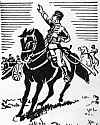|
At the treaty of Westphalia in 1648, Metz, along with Toul and Verdun, was ceded to France and comparative peace reigned for over 200 years, until 1870, when in the Franco-Prussian War it was captured by the Germans. This was the first time in hundreds of years that this famous fortress had succumbed to an enemy.  The
War of 1870 was fought a little differently from Caesar's
campaigns. Instead of Roman swords and spears, the Germans used
cavalry and sabers together with infantry and guns. One of the
hardest
battles of the Franco-Prussian War was fought before Metz - its main
feature was a great cavalry duel with 2,000 horsemen on each side.
In
August, 1870, Metz was encircled - 150,000 French soldiers were
squeezed into the Fortress. The Germans were unable to capture the city
by frontal assault so they used another weapon - starvation. The
War of 1870 was fought a little differently from Caesar's
campaigns. Instead of Roman swords and spears, the Germans used
cavalry and sabers together with infantry and guns. One of the
hardest
battles of the Franco-Prussian War was fought before Metz - its main
feature was a great cavalry duel with 2,000 horsemen on each side.
In
August, 1870, Metz was encircled - 150,000 French soldiers were
squeezed into the Fortress. The Germans were unable to capture the city
by frontal assault so they used another weapon - starvation. By the end of September the rations inside of the town had been reduced to such an extent that the French soldiers were slaughtering their horses. When October rolled around, the end was in sight; and on October 13th - just seventy-four years ago, negotiation began for the surrender. Metz had fallen and as a city in Alsace-Lorraine became a part of the German Empire. |








